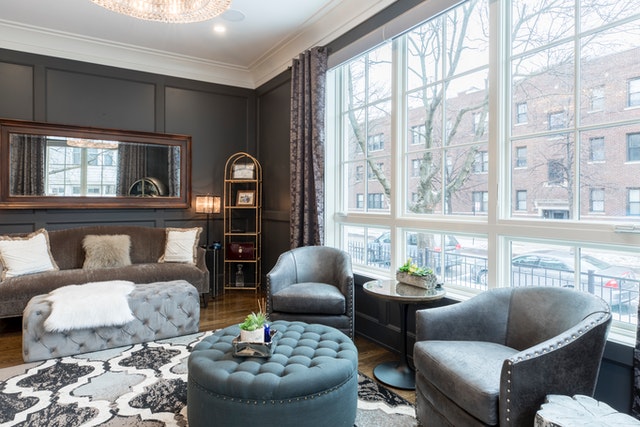

The term “empty nester” refers to a parent or parents who have children that have recently left home. Most children move out when they attend college, get married, or simply decide to head out into the world on their own. This newfound freedom can be exciting for parents, since it provides the chance to start focusing on their own needs, after years of setting them aside in order to put the kids’ needs and requirements first. According to the United States Census Bureau, there were approximately 22.5 million empty-nester couples as of 2014, and that number is likely growing. The average age of an empty nester is around 55 years old, but it can vary depending on when you had your children and when they moved out.
If you’re an empty nester, it’s a great time to consider making some changes to your home. This guide offers some easy tips to help you renovate your home and ideas to reuse empty spaces, making them more suitable to your needs, and maybe even setting up the space for starting that new hobby you always wanted to try.
How to Cope with Empty Nester Syndrome
The term “empty nester syndrome” refers to feelings of grief, loneliness, emptiness, or confusion when your children leave home. Here are some tips to help you adjust and cope with the change.
- Accept the fact that your children are now adults and respect their decision to move out of the home. Don’t compare their timing to yours, but instead, support their decision and cheer on their success.
- Stay in touch with your kids often so you can feel connected. Whether through phone calls, emails, or letters, this will give you peace of mind and help you feel less alone.
- If you are a single parent transitioning into an empty nest lifestyle, you can find a group of empty nesters with people going through the same process. Getting support from others will make this transition period more manageable.
- Keep a positive mindset and use this time to focus on yourself. It’s also a great time to reconnect with your partner if you have one. Give yourself a chance to do some of the things you’ve always wanted to do on your own and as a couple.

What Do Empty Nesters Want in a Home?
Now that your nest is empty, it’s time to think about what you really want out of your home. Here are some of the things that many empty nesters are looking for.
- Luxury touches: Consider upgrading your flooring to a high-end material like hardwood or renovate your kitchen and install granite countertops. Empty nesters may downsize, but they also like to spend more on luxury features like better appliances and an upgraded bathroom with a soaker tub.
- Low maintenance: Many empty nesters prefer a low-maintenance abode with no kids to help around the home. Consider buying a new construction home that comes with a whole-home warranty. Update items like your HVAC system or plumbing that need repair now to enjoy them for years to come without worrying about ongoing maintenance issues.
- Pet-friendly features: Many empty nesters like to adopt a pet or two, so they have something to love and care for. If you have pets, consider adding a few pet-friendly features like a special eating area for your pet, a washing and drying station, or a built-in dog or cat bed area under the stairs or in an empty cabinet.
- Accommodations for family visits and gatherings: Update your child’s former bedroom and bathroom to make it nice for guests. This is a great time to do some remodeling or make a few changes to make visits from family and friends more comfortable. Look for new ways to enjoy your dining and living room, too. You can set up the dining room for cocktails or upgrade your living room furniture to something nicer and a bit more formal.

Do Home Renovations Make Financial Sense for You?
So close to retirement, it’s not always wise to drop all of your cash on renovating a home unless you expect to turn around and sell. With that in mind, the first step of renovating as an empty nester is to consult your retirement plan and weigh your options with your financial advisor if you have one.
Consider the following questions before renovating:
- What do I need and why?
- How will the remodel make me feel?
- How much will it cost?
- How do I plan to pay for it?
- Will this renovation increase my everyday enjoyment and home functionality?
If renovating as an empty nester makes sense with your retirement plan, you have a variety of options to make your renovation dreams come true. Some options to explore include using your own savings or credit cards, home equity lines of credit, home equity loans, reverse mortgage loans, government loans, or home renovation or repair loans. But again, make sure that paying for renovations now doesn’t hurt your ability to retire when you had planned.
Home Revamp Tips for Empty Nesters
Once you determine what you want to get out of your space, it’s time to do some planning. Here are some tips to help you revamp your newfound empty nest.
- Set up a budget: Make sure you plan your home revamp on a budget. Sit down and go over how much money you have to spend and how much you’re willing to dish out for various changes. You may want to consult with a contractor in your area if you’re making significant upgrades like knocking down a wall or completely remodeling a bathroom or the kitchen. Compare the cost of different projects and materials, so you know what to expect. You can also make changes a little bit at a time as you adjust the budget. Look for things you can DIY, such as painting the walls a new color or updating furniture.
- Don’t downsize too much: You may be tempted to get rid of a lot of items or downsize to a smaller home entirely. While downsizing can help with upkeep, you don’t want to downsize too much, or you won’t have room for visitors or your kids when they come to visit. If you move into a smaller home, invest in a quality sleeper sofa so you can provide a comfy place for overnight guests to sleep.
- Futureproof for a growing family: Make upgrades to your home that will still work for you in the future. If you end up with grandkids, you’ll want to be sure you have room for them to spend the night, too. Keep in mind that certain updates might not work for you as you age. Think ahead by making careful decisions that will still work for your lifestyle as you get older.
- Make spare bedrooms multipurpose: Your new spare bedroom can serve several purposes in one. Look for new ways to enjoy this room year-round while still providing comfortable accommodations for overnight guests. We’ll discuss tips to revamp a spare bedroom later in the guide.
- Organize smartly and save space: Keep your pantry, kitchen cabinets, and bathroom neat and organized. The more organized your home is, the more room you’ll save. Consider investing in a new closet system so you can keep spare blankets and linens out of the way, too. Upgrade your medicine cabinet or buy bins to help you keep items separated and in a central location for easy access.
- Splurge on luxury touches: Now’s a great time to do a little splurging if you have the budget. Install high-end faucets and light fixtures or upgrade your flooring to something made of quality materials. New granite or marble kitchen countertops can be an excellent upgrade. Replace old, worn-out furniture with designer pieces or something from a better brand.
- Choose the best you can afford: Now that the kids are gone, it’s time to spend a little more money on your home renovation. Try to choose the best quality you can afford. The higher the quality, the longer it’ll last. While you may spend more money upfront, it will help you save long-term and give you peace of mind.
Spare Room Renovation Ideas
Now that you have extra space to work with, you can consider these ideas to reuse an empty space to set up something that fulfills your needs. After all those years of dedicating most of your time and energy to raising children, now is a good time to design the space you deserve, letting you do a lot of “me time” and giving you joy every day.


- Upgrade the primary bedroom: Install new flooring and light fixtures or purchase a new bedroom set to make your primary bedroom feel luxurious. Expand your master closet or bring in a beautiful armoire and some accent furniture like a beautiful bench or ottoman.
- Expand the bathroom: Give your bathroom a proper update by expanding it and making it more spa-like. A larger vanity with double sinks, a huge walk-in shower, or a new jetted tub is a great way to enjoy the bathroom. Try a nice rainfall showerhead or install heated floors to give the bathroom a major upgrade.
- Walk-in closet: If you’re short on storage, consider making your current closet larger. A walk-in closet with some shelving will give you more room for clothes, shoes, linens, blankets, and bags.
- Wine cellar: Repurpose your basement and turn it into your wine cellar. Use shelving that’s specially tailored to hold wine bottles so you can keep them organized. If you don’t have space for a wine cellar, even a new wine fridge in your kitchen is an excellent update for your empty nest.
- Arts and crafts room: Transform a spare room into your workspace for arts and crafts. Bring in a sewing machine or a large table where you can work. An easel or potter’s wheel can also be great additions. Create a unique shelving system to keep all your paint and paintbrushes, needles and thread, or other craft items organized.
- Entertainment room – games and bar: Give a spare room a total makeover by turning it into an awesome entertainment area. You can also add a bar and some barstools, a pool table, a shuffleboard table, or a flatscreen TV. If you have the extra square footage, consider adding a comfortable sectional or a pair of nice recliners.

- Home theater: Transform a spare bedroom into a personal home theater. Paint the walls a dark color and install soundproofing to make the room feel authentic. Bring in comfortable leather home theater seating and install a projector and screen with a surround sound system. A large wall-mounted TV is also an excellent choice for a home theater. If you have a basement that you can transform, that is also an ideal place to build a basement home theater.
- Meditation room: Go Zen by designing a meditation room. Paint the walls a calming hue and add some greenery to make it feel serene. You can also use incense or essential oil diffusers to help set the mood. Add a stereo system to listen to calming music while you relax and meditate.
- Workout room: Take advantage of a new spare room by making it your private home gym. Add a stationary bike, a treadmill, or an elliptical machine. You should protect your floors by adding some rubber floor tiles or gym-style flooring.
- Man / Woman Cave: Set up the room for the man of the house, so he has a private space to relax. A comfy leather couch and a nice TV are excellent choices for a man or woman’s cave.
- Library / Reading nook: Fill the spare room with beautiful bookshelves to have a place for all your favorite reading materials. Add a floor lamp, a soft area rug, and a cozy, comfy chair.
- Guest room: Update the spare bedroom and turn it into a lovely space for guests. Paint the walls a new color, install new light fixtures, and replace your child’s bedroom furniture with something more fitting for adults. A queen or king-size bed is best if you have the space.
- Suite for an aging parent: Many empty nesters make room for their aging parents. Now is an excellent time to consider revamping the spare bedroom into a suite for your elderly parent or parents.
Empty Nesting and Home Insurance: Adapting Your Coverage
As the years go by and children grow up, the dynamic of a household changes. The transition to an “empty nest” stage, where children move out to pursue their own lives and careers, brings both a sense of newfound freedom and a need to reassess various aspects of life. One important consideration during this phase is home insurance.
Why Reevaluate Home Insurance
With fewer occupants in the home, there are several reasons to take a closer look at your home insurance coverage:
- Changing Risks: With children moving out, the dynamics of your household change. This may mean a decrease in foot traffic, less wear and tear on the property, and a reduced likelihood of accidents. As such, your insurance needs may also shift.
- Possessions: Empty nesting could also mean fewer belongings in the home. This may allow you to reevaluate the coverage needed for personal property.
- Space Usage: If empty nesters choose to downsize or repurpose rooms, the use of different areas of the home may change. This can affect the way insurance assesses various parts of the property.
Adjusting Your Home Insurance
When entering the empty nest phase, consider these steps to ensure your home insurance aligns with your new circumstances:
- Review Your Policy: Take the time to review your current home insurance policy. Understand what is covered, what might need to change, and if any aspects of the policy no longer apply to your situation.
- Coverage Amounts: Assess whether your coverage limits are appropriate for your evolving needs. This includes dwelling coverage, personal property coverage, and liability protection.
- Discounts: Some insurance companies offer discounts for empty nesters. You might be eligible for reduced rates due to the decreased risks associated with fewer people living in the home.
- Valuables: If you have valuable items such as jewelry, art, or collectibles, ensure they are properly insured. Adjust coverage based on what remains in the home.
- Liability Coverage: Liability coverage protects you from legal claims arising from accidents on your property. As the household dynamics change, consider the impact on your liability coverage needs.
Consultation with an Insurance Agent: When adapting your home insurance during the empty nest phase, it’s recommended to consult with your insurance agent. They can provide expert guidance tailored to your specific situation, ensuring that your coverage remains adequate while potentially saving you money.
If you’re an empty nester, it’s a great time to consider changing your home. Keep these renovation tips in mind to get the most out of your house once your kids have flown the coop. With a positive mindset and some patience, you can revamp your space and have all those luxury touches you always wanted.
Article written by Denise Garcia.
Read more at https://porch.com/advice/home-renovations-empty-nesters
